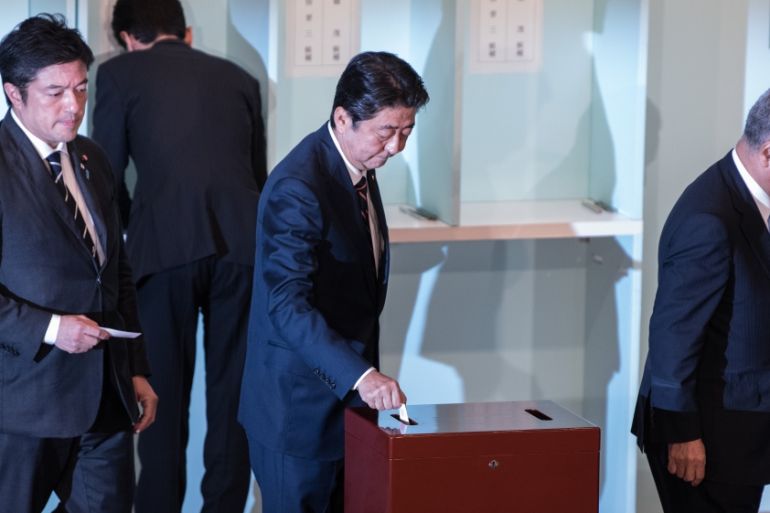Japan’s Shinzo Abe wins ruling party leadership vote
The ruling Liberal Democratic Party vote sets Abe on track to become Japan’s longest-serving prime minister.

Prime Minister Shinzo Abe won a ruling party leadership vote on Thursday, setting him on track to become Japan’s longest-serving prime minister and try to cement his legacy, including by revising the pacifist constitution.
The 63-year-old conservative secured 553 votes against 254 won by former defence minister Shigeru Ishiba, a hawkish self-confessed “military geek”, in a two-horse race for leader of the Liberal Democratic Party.
Keep reading
list of 4 itemsBoeing hit with 32 whistleblower claims, as dead worker’s case reviewed
US imposes new sanctions on Iran after attack on Israel
A flash flood and a quiet sale highlight India’s Sikkim’s hydro problems
The win effectively hands Abe three more years as prime minister, giving him the chance of breaking the record for the nation’s longest-serving prime ministership held by Taro Katsura, a revered politician who served three times between 1901 and 1913.
If Abe stays in office through November 2019, he will have exceeded the 2,886 days marked by Katsura.
![Abe wants to revise Japan's pacifist constitution [Omohiro Ohsumi/Getty]](/wp-content/uploads/2018/09/f0a860f6284e4027906de5e1defb1758_18.jpeg)
While Japanese voters put the economy and social security as their top priorities, Abe aims to use the election to push his dream of reforming the country’s post-World War II pacifist constitution.
Nationalist Abe has frequently voiced his wish to rewrite the charter, imposed by the victorious US occupiers, which forces the country to “forever renounce war” and dictates that armed forces will “never be maintained”.
Abe insists any changes would merely remove the country’s well-equipped Self-Defence Forces from the constitutional paradox whereby they should not technically exist.
“It’s time to stipulate both the Self-Defence Forces and the protection of Japan’s peace and independence in the constitution,” Abe said in his last stump speech in Tokyo.
But any changes to the text would be hugely sensitive in pacifist Japan and almost certainly greeted with fury in China and the Koreas, 20th-century victims of Japanese military aggression.
Even if Abe manages to force a revision through parliament, he would face a referendum, raising the prospect of a Brexit-style political meltdown if the people vote against him, said Yu Uchiyama, a political scientist from the University of Tokyo.
In addition, surveys show that tinkering with the legal text is far from the top of most Japanese voters’ to-do list, as the country faces an ageing and declining population and a still-sluggish economy.